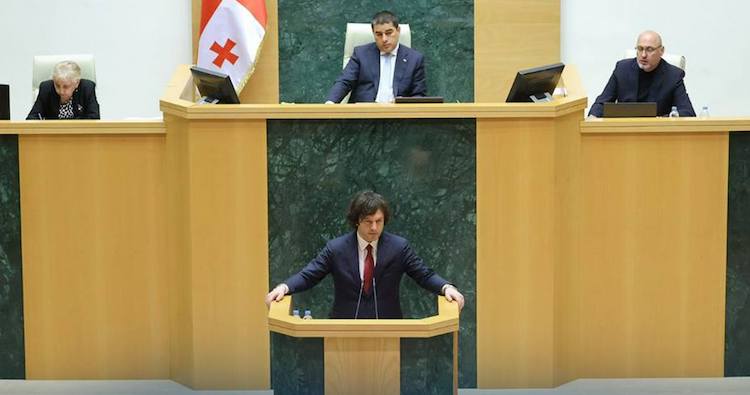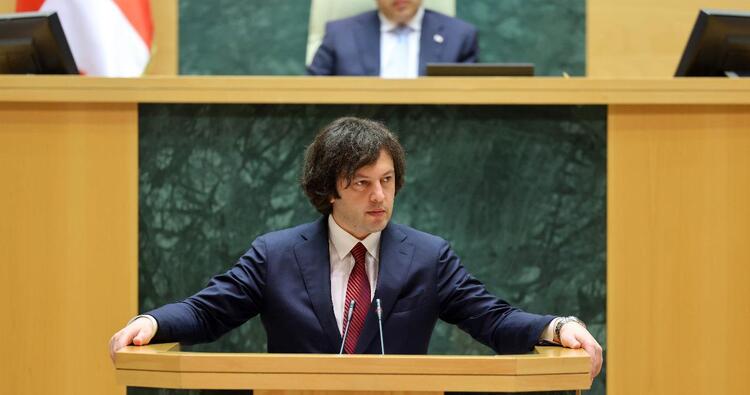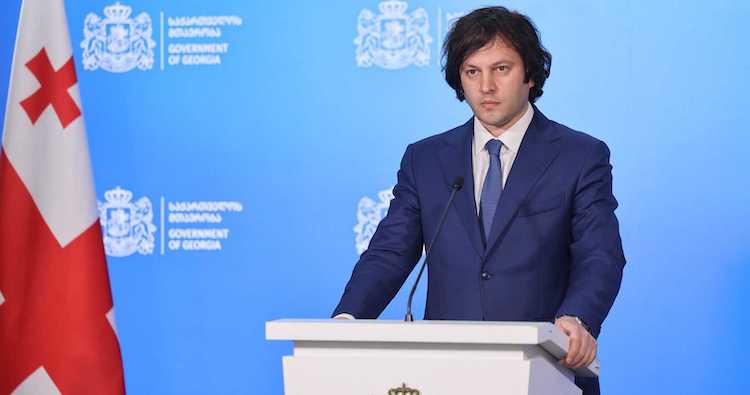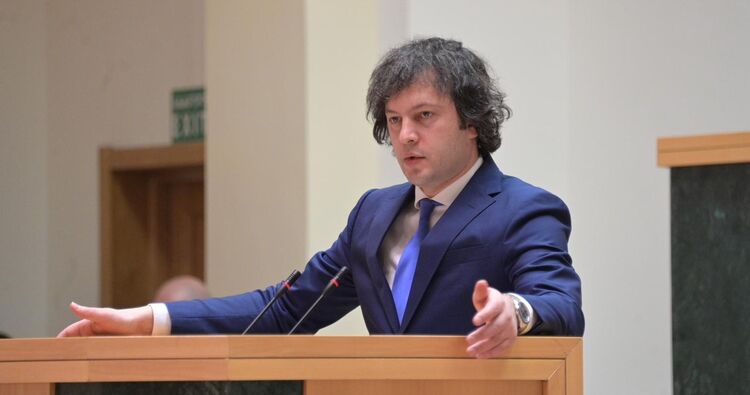Georgian PM highlights Gov’t efforts in social, economic development to Parliament
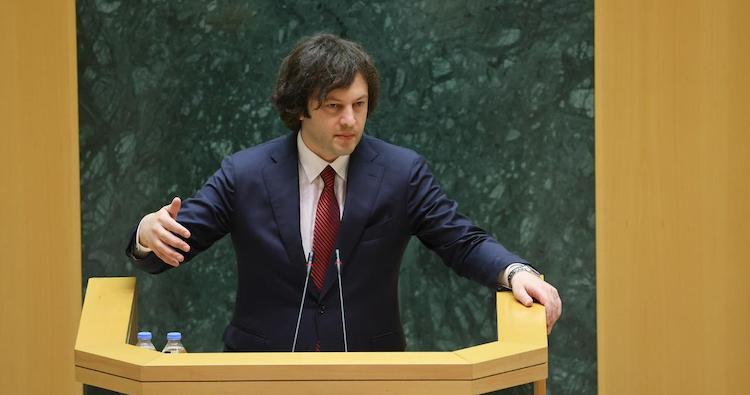
Georgian Prime Minister Irakli Kobakhidze highlighted his Government’s efforts in social and economic development of the country to the Parliament, highlighting a “steady increase” in funding for local self-government bodies, budget volumes and revenues. Photo: Gov't Administration
Georgian Prime Minister Irakli Kobakhidze on Friday highlighted his Government’s efforts in social and economic development of the country to the Parliament, highlighting a “steady increase” in funding for local self-government bodies, budget volumes and revenues.
The PM noted the “successful implementation” of 78 projects worth up to ₾730 million ($260.74mln) under the second phase of the Renewed Regions state infrastructure programme in comments to lawmakers.
He said 864 infrastructure projects in municipalities had received financing of up to ₾350 million ($125mln) from the Georgia Regional Development Fund last year, with ₾400 million ($142.87mln) distributed this year. The Government head added ₾40.60 million ($14.50mln) had been allocated last year to the rural support programme, financing 3,780 projects.
Kobakhidze told the legislative body there would be 365,000 new beneficiaries of the state efforts to ensure uninterrupted water supply across the country this year, including 130,000 individuals who had never received centralised supply before. He also highlighted the completion of works for providing access to natural gas to over 9,000 families in 63 settlements.
The PM emphasised ensuring water supply was “one of the key priorities” as part of infrastructure development and added work was “progressing according to plan” with the aim of providing all cities with central water supply by the end of 2025.
Kobakhidze also highlighted “significant measures” for environmental protection, including the development of hydrometeorological and geological hazard maps, geological monitoring at 18 locations with landslide risks and assessment of threats in glacial valleys by Swiss experts.
In addition, he mentioned improvements made to atmospheric air and water quality monitoring network and forest restoration initiatives, carried out last year on 1,679 hectares of degraded forest massifs.
A new protected area spanning over 15,000 hectares has been created and the construction of a 690-km-long hiking trail network in eight protected areas is underway”, he said, adding the rehabilitation of tourist and ecotourism infrastructure in protected areas had also been a focus of attention.
The PM also told MPs about ongoing social, economic, infrastructural, agricultural, healthcare, educational and cultural development in villages near the administrative lines separating Georgia from its Russian-occupied regions.
More than 14,000 families have received financial assistance to help with heating during the winter, and around 2,000 students have been financially supported by the Government to pursue higher education, he told the Parliament, adding 28 houses in the village of Zardiaantkari in the central Shida Kartli region that had been damaged in the 2008 war with Russia had been repaired.
He said the Government had been gradually expanding the bilingual education model in pre-schools and schools, introducing the bilingual method of teaching the state language in 36 kindergartens and 184 public schools.
To address a “lack of highly qualified personnel” in non-Georgian-speaking schools in regions, 397 Georgian-speaking teachers have been deployed, he said, while 129 business projects from the occupied regions of Abkhazia and Tskhinvali (South Ossetia) have been registered under the Peace Fund grant competition, with 22 Georgian-Abkhazian and Georgian-Ossetian business projects receiving funding.
In the previous year, 235 students from the occupied territories were admitted to higher education institutions in Georgia without taking exams. Moreover, up to 1,200 people from the Abkhazia region and 300 from the Tskhinvali region have benefited from free medical services provided under the State Referral Programme”, Kobakhidze said.
He added the Government continued to support medical institutions in Abkhazia by regularly supplying vaccines, medicines, antiviral tests and medical equipment through a status-neutral coordination mechanism.
In addition to medical support, the Government is also providing assistance to the local population and agricultural activities in Abkhazia, he said, adding means of protection for plants and animals worth more than ₾400,000 ($142,873) had been transferred to the Abkhazia region.
The PM also noted a programme to find and repatriate people missing after the armed conflicts of the 1990s and the 2008 Russia-Georgia war, adding the remains of 68 missing individuals had been identified, interred and returned to their families with a formal burial ceremony over the last 12 months.
Kobakhidze also told the MPs the Government’s “main task and desire” was to ensure “every citizen returns to their homeland”, saying “economic growth will also serve as an incentive in this regard”.
The PM highlighted “numerous important measures and projects” were being implemented to “strengthen the connection” of the Georgian diaspora with their state.
He also told the Parliament efforts for promotion of culture, sport, education and youth, defence and security, justice and infrastructure, healthcare and promotion of the state in international ratings included:
- About 500 projects receiving funding under the culture promotion programme, including around 60 festivals, 50 anniversary events, translation and publication of 50 books, as well as other professional competitions and events.
- Planned increase of salaries of school teachers and administrative staff by an average of ₾500 ($178.59) starting next month.
- Construction and rehabilitation of 250 schools, six vocational schools and two educational workshops being currently in progress.
- A paid internship programme for up to 3,000 graduates to participate in paid internships in public service, private sector and municipalities, set to launch in September.
- The Ministry of Defence’s “successful development” of anti-armour, air defence, artillery, intelligence, engineering and cybersecurity capabilities and update of infrastructure of the Defence Forces.
- Construction initiated for 11 public service halls to ensure access to them in “all key locations”.
- A quadrupling of the budget of the healthcare sector since 2012, to ₾1.8 billion ($0.64bln) by 2023, and plans for further increases in healthcare financing.
- Georgia being placed ahead of 10 EU member states in combating corruption, with Government plans to improve the result to a top-three ranking.
- “All international evaluations testifying” to the “progress achieved” by the country in combating trafficking, with the state ranking 14th among 160 countries and first in the region.
The PM said the Government was “proud of the achievements” in the penitentiary field and noted further development of the infrastructure of the system was “one of the most important priorities”.
He told MPs recent changes to the system included:
- The construction of a penitentiary facility of the “highest European standards”, designed for 700 convicts, in Daba Laituri in western Guria region
A small penitentiary for 150 convicts going under construction in Rustavi, a city south-east of capital Tbilisi - “Complete renovation” of sports grounds and infrastructure in penitentiary institutions and opening of public service halls at penitentiary institutions since June 2023
- The launch of a training base of the Justice Training Centre
- “Continued strengthening” of resocialisation and rehabilitation programmes
- Hosting of sports festivals, training and employment programmes for coaches and instructors in penitentiary institutions
- New medical equipment purchased at “all penitentiary institutions” and identification of needs and equipping of their medical points
- Introduction of PROBBOX, an innovative device for electronic control and service provision of probationers, at 20 locations
Kobakhidze also said renovation of infrastructure and material base of the Ministry of Internal Affairs, construction and improvement of bases, barracks and other police infrastructure was continuing.
I would also like to mention separately that the construction of Police City started in Tbilisi last year. Seven multi-storey buildings are being built. About 1,000 police officers will be given flats”, he added.
The head of the Government also “active work” was ongoing on strengthening the capabilities of special purpose institutions - the State Security Service, Intelligence Service and State Protection Special Services - with further development of the institutions remaining “one of the main priorities” of the Government.
 Tweet
Tweet  Share
Share
